
The School of Informatics is an academic unit of the University of Edinburgh, in Scotland, responsible for research, teaching, outreach and commercialisation in informatics. It was created in 1998 from the former department of artificial intelligence, the Centre for Cognitive Science and the department of computer science, along with the Artificial Intelligence Applications Institute (AIAI) and the Human Communication Research Centre.
Developmental robotics (DevRob), sometimes called epigenetic robotics, is a scientific field which aims at studying the developmental mechanisms, architectures and constraints that allow lifelong and open-ended learning of new skills and new knowledge in embodied machines. As in human children, learning is expected to be cumulative and of progressively increasing complexity, and to result from self-exploration of the world in combination with social interaction. The typical methodological approach consists in starting from theories of human and animal development elaborated in fields such as developmental psychology, neuroscience, developmental and evolutionary biology, and linguistics, then to formalize and implement them in robots, sometimes exploring extensions or variants of them. The experimentation of those models in robots allows researchers to confront them with reality, and as a consequence, developmental robotics also provides feedback and novel hypotheses on theories of human and animal development.
Robot learning is a research field at the intersection of machine learning and robotics. It studies techniques allowing a robot to acquire novel skills or adapt to its environment through learning algorithms. The embodiment of the robot, situated in a physical embedding, provides at the same time specific difficulties and opportunities for guiding the learning process.

Sebastian Thrun is a German-American entrepreneur, educator, and computer scientist. He is chief executive officer of Kitty Hawk Corporation, and chairman and co-founder of Udacity. Before that, he was a Google vice president and Fellow, a Professor of Computer Science at Stanford University, and before that at Carnegie Mellon University. At Google, he founded Google X and Google's self-driving car team. He is also an adjunct professor at Stanford University and at Georgia Tech.

Peter Dayan is a British neuroscientist and computer scientist who is director at the Max Planck Institute for Biological Cybernetics in Tübingen, Germany, along with Ivan De Araujo. He is co-author of Theoretical Neuroscience, an influential textbook on computational neuroscience. He is known for applying Bayesian methods from machine learning and artificial intelligence to understand neural function and is particularly recognized for relating neurotransmitter levels to prediction errors and Bayesian uncertainties. He has pioneered the field of reinforcement learning (RL) where he helped develop the Q-learning algorithm, and made contributions to unsupervised learning, including the wake-sleep algorithm for neural networks and the Helmholtz machine.
The Max Planck Institute of Neurobiology was a research institute of the Max Planck Society located in Martinsried, a suburb of Munich in Germany. It existed between 1984 and 2022 and merged with the Max Planck Institute for Ornithology to the new, joint Max Planck Institute for Biological Intelligence in 2023.

Founded on 18 March 2011, the Max Planck Institute for Intelligent Systems (MPI-IS) is one of the 86 research institutes of the Max Planck Society. With locations in Stuttgart and Tübingen, it combines interdisciplinary research in the growing field of intelligent systems. Intelligent systems are becoming increasingly important in many areas of life – as virtual systems on the Internet or as cyber-physical systems in the physical world. Artificial intelligent systems can be used in a broad range of areas, for instance in autonomous vehicles or to diagnose and fight diseases.
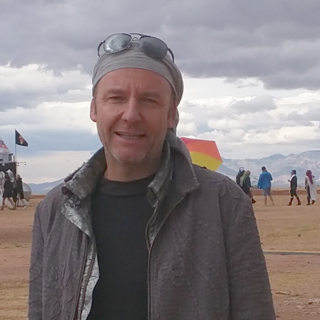
Hartmut Neven is a German American scientist working in quantum computing, computer vision, robotics and computational neuroscience. He is best known for his work in face and object recognition and his contributions to quantum machine learning. He is currently Vice President of Engineering at Google where he leads the Quantum Artificial Intelligence Lab, which he founded in 2012.
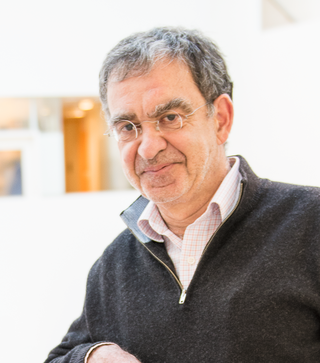
Tomaso Armando Poggio, is the Eugene McDermott professor in the Department of Brain and Cognitive Sciences, an investigator at the McGovern Institute for Brain Research, a member of the MIT Computer Science and Artificial Intelligence Laboratory (CSAIL) and director of both the Center for Biological and Computational Learning at MIT and the Center for Brains, Minds, and Machines, a multi-institutional collaboration headquartered at the McGovern Institute since 2013.
In artificial intelligence, apprenticeship learning is the process of learning by observing an expert. It can be viewed as a form of supervised learning, where the training dataset consists of task executions by a demonstration teacher.
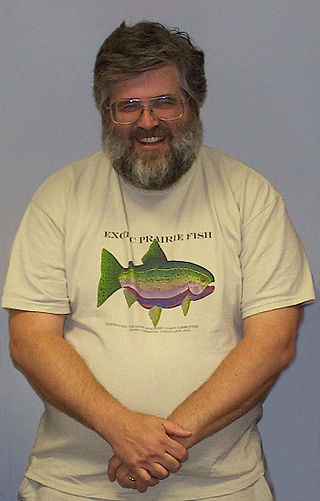
Christopher Granger Atkeson is an American roboticist and a professor at the Robotics Institute and Human-Computer Interaction Institute at Carnegie Mellon University (CMU). Atkeson is known for his work in humanoid robots, soft robotics, and machine learning, most notably on locally weighted learning.
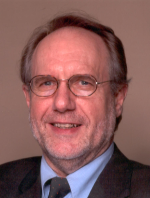
Armin Bernd Cremers is a German mathematician and computer scientist. He is a professor in the computer science institute at the University of Bonn, Germany. He is most notable for his contributions to several fields of discrete mathematics including formal languages and automata theory. In more recent years he has been recognized for his work in artificial intelligence, machine learning and robotics as well as in geoinformatics and deductive databases.
Klaus-Robert Müller is a German computer scientist and physicist, most noted for his work in machine learning and brain–computer interfaces.
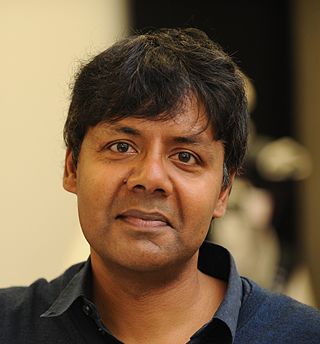
Sethu Vijayakumar is Professor of Robotics at the University of Edinburgh and a judge on the BBC2 show Robot Wars. He is the Programme co-Director for Artificial Intelligence at The Alan Turing Institute, the UK's National Institute for Data Science and Artificial Intelligence, with the responsibility for defining and driving the institute's Robotics and Autonomous Systems agenda. He co-founded the Edinburgh Centre for Robotics in 2015 and was instrumental in bringing the first NASA Valkyrie humanoid robot out of the United States of America, and to Europe, where is it a focus of research at the School of Informatics. He was elected as a Fellow of the Royal Society of Edinburgh in 2013.
Peer Fischer is a German robotics researcher, specializing in biological nanorobotics.

Jan Peters is a German computer scientist. He is Professor of Intelligent Autonomous Systems at Department of Computer Science of the Technische Universität Darmstadt.

Aude G. Billard is a Swiss physicist in the fields of machine learning and human-robot interactions. As a full professor at the School of Engineering at Swiss Federal Institute of Technology in Lausanne (EPFL), Billard’s research focuses on applying machine learning to support robot learning through human guidance. Billard’s work on human-robot interactions has been recognized numerous times by the Institute of Electrical and Electronics Engineers (IEEE) and she currently holds a leadership position on the executive committee of the IEEE Robotics and Automation Society (RAS) as the vice president of publication activities.

Auke Jan Ijspeert is a Swiss-Dutch roboticist and neuroscientist. He is a professor of biorobotics in the Institute of Bioengineering at EPFL, École Polytechnique Fédérale de Lausanne, and the head of the Biorobotics Laboratory at the School of Engineering.
Felix Heide is a German-born computer scientist known for his work in the fields of computational imaging, computer vision, computer graphics and deep learning. He is an assistant professor at Princeton University and was the head of the Computational Imaging Lab. He serves as Head of Artificial Intelligence at Torc Robotics. Heide co-founded Algolux, a startup in computer vision technology for self-driving vehicles, which later merged with Torc Robotics.

Thomas L. Dean is an American computer scientist known for his work in robot planning, probabilistic graphical models, and computational neuroscience. He was one of the first to introduce ideas from operations research and control theory to artificial intelligence. In particular, he introduced the idea of the anytime algorithm and was the first to apply the factored Markov decision process to robotics. He has authored several influential textbooks on artificial intelligence.












